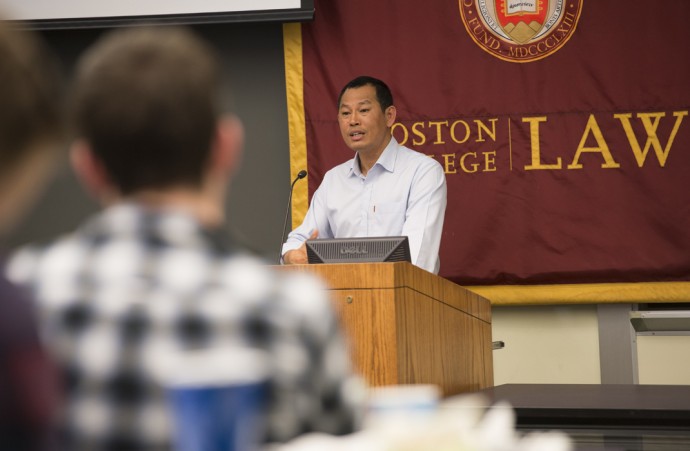Scholar Maung Zarni Defines Genocide in ‘Holocaust and Human Rights Project’ Lecture
TRANSCEND MEMBERS, 20 Apr 2015
David Reich - Boston College Law School Magazine
15 Apr 2015 – The word genocide calls to mind events like the Jewish and Armenian holocausts, but according to Maung Zarni, a Burmese scholar affiliated with Harvard and the London School of Economics, smaller-scale killing can also fit the definition “if done in an attempt to destroy a people.”
Such is the case with the victimization of Burma’s Rohingya Muslim ethnic group by members of the Buddhist majority, which has involved explicit violence on a relatively modest scale but also forced birth control, forced relocation, and denial of access to food and medical care, said Zarni, who on April 13, delivered a lecture on the topic, sponsored by the Law School’s Owen M. Kupferschmid Holocaust and Human Rights Project.
How could Buddhists, raised to spare the lives of all creatures, even insects, perpetrate a genocide? The answer, Zarni said, is common to every genocide: the perpetrator learns to see himself as a victim, and a defender of his nation or ethnic group. “We have to frame the target of the attack as a threat to our livelihood, a threat to our national community, as a virus, a leach, a bloodsucker,” he said.
All genocides have another common element, Zarni said, in that the genocidal acts are orchestrated, not spontaneous. “This is not like football hooliganism,” he said, “where your team lost and you want to express your rage. You always find an organization, you always find leaders who are mobilizing public opinion [in favor of] an act that is otherwise unthinkable.”
_____________________________
Dr. Maung Zarni, Associate Fellow, the University of Malaya, is a member of the TRANSCEND Network for Peace, Development and Environment, founder and director of the Free Burma Coalition (1995-2004), and a visiting fellow (2011-13) at the Civil Society and Human Security Research Unit, Department of International Development, London School of Economics. His forthcoming book on Burma will be published by Yale University Press. He was educated in the US where he lived and worked for 17 years. Visit his website http://www.maungzarni.net.
Go to Original – lawmagazine.bc.edu
DISCLAIMER: The statements, views and opinions expressed in pieces republished here are solely those of the authors and do not necessarily represent those of TMS. In accordance with title 17 U.S.C. section 107, this material is distributed without profit to those who have expressed a prior interest in receiving the included information for research and educational purposes. TMS has no affiliation whatsoever with the originator of this article nor is TMS endorsed or sponsored by the originator. “GO TO ORIGINAL” links are provided as a convenience to our readers and allow for verification of authenticity. However, as originating pages are often updated by their originating host sites, the versions posted may not match the versions our readers view when clicking the “GO TO ORIGINAL” links. This site contains copyrighted material the use of which has not always been specifically authorized by the copyright owner. We are making such material available in our efforts to advance understanding of environmental, political, human rights, economic, democracy, scientific, and social justice issues, etc. We believe this constitutes a ‘fair use’ of any such copyrighted material as provided for in section 107 of the US Copyright Law. In accordance with Title 17 U.S.C. Section 107, the material on this site is distributed without profit to those who have expressed a prior interest in receiving the included information for research and educational purposes. For more information go to: http://www.law.cornell.edu/uscode/17/107.shtml. If you wish to use copyrighted material from this site for purposes of your own that go beyond ‘fair use’, you must obtain permission from the copyright owner.
